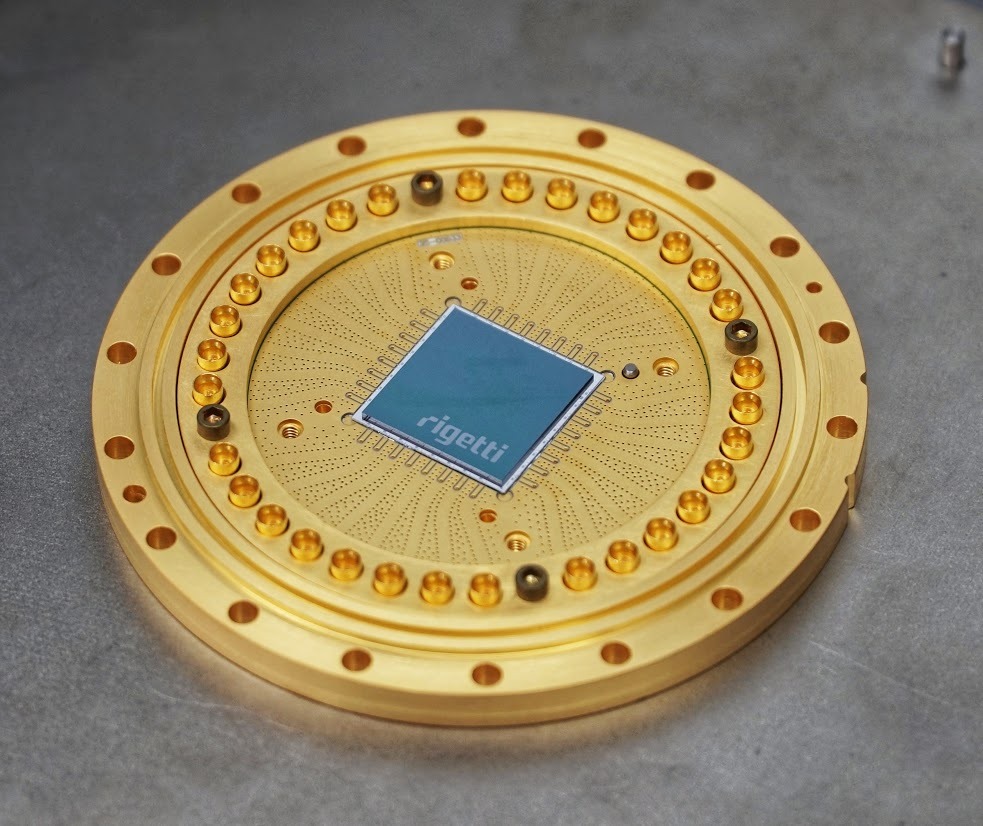Unsupervised Machine Learning Demonstrated On Quantum Computer
Get Tom's Hardware's best news and in-depth reviews, straight to your inbox.
You are now subscribed
Your newsletter sign-up was successful
Rigetti, a full-stack (hardware and software) quantum computing startup from California, demonstrated that its new 19-qubit quantum computer could speed up unsupervised machine learning algorithms.
Rigetti Quantum Computing
Although it’s a relatively new entrant in the quantum computing market, Rigetti is considered one of the main players in the current quantum computing race. The company was founded in 2013 by Chad Rigetti, who previously worked on quantum computers at IBM.
The company was able to create a three-qubit chip made of aluminum circuits on a silicon wafer early in 2016. By spring 2017, Rigetti was testing eight-qubit quantum chips, and by June of this year, the company announced its Forest 1.0 cloud quantum computing platform, which allows developers to write hybrid (classical and quantum) algorithms.
Machine Learning On Quantum Computers
Although machine learning wasn’t necessarily one of the first applications people imagined for quantum computers, the fact that the machine learning field is experiening explosive growth right now is also incentivizing quantum computer developers to research machine learning applications on quantum computers.
If machine learning could somehow be sped up by the power of quantum computers, it could be revolutionary. It’s still not clear yet what benefits quantum computers could bring over the long term to machine learning, but one benefit could be not having to use large server farms to train neural networks with millions of data assets.
Quantum computers could be much more efficient at optimizing and fine-tuning neural networks with much less data, or they could be used to train a neural network in a much shorter amount of time. However, this also implies having a powerful enough quantum computer (likely hundreds of thousands of logical qubits).
Unsupervised Machine Learning On Rigetti 19Q
Rigetti announced that it was able to demonstrate unsupervised machine learning on its new 19-qubit quantum computer. Unsupervised machine learning refers to the neural networks being able to train on raw data without any pre-labeling of that data.
Get Tom's Hardware's best news and in-depth reviews, straight to your inbox.
The company achieved this with a quantum/classical hybrid algorithm for clustering data. Clustering analysis is one of the most common ways to do unsupervised machine learning in order to find hidden patterns within the analyzed data. It's often used in advertising, credit scoring, and image segmentation.
This means that Rigetti’s quantum computer and its approach to hybrid quantum/classical algorithms could soon find uses in the real world. However, Rigetti warned that they still need more qubits in order to show that this solution is faster and more effective than purely classical approaches. This could be achieved once quantum supremacy (quantum computers beating any supercomputer at a given task) is reached. For now, Rigetti’s solution is only a proof of concept, but one that shows high potential.
Forest 1.2 Platform
Much like IBM, Rigetti is trying to build a community of interested quantum computing researchers and an ecosystem of algorithms that will be able to take full advantage of powerful quantum computers the moment they arrive.
The company developed the Forest platform, which allows developers to test their hybrid quantum/classical algorithms against the latest 19-qubit quantum computer as well as against a 36-qubit simulated quantum chip.
The new 1.2 version of Forest brings a few other features that were developed with feedback from the Forest community:
Customizable noise models in the Quantum Virtual Machine that allow you to simulate arbitrary quantum channels to study the robustness of algorithms to processor noise.Automatic compilation to the 19Q gate set and qubit layout.An improved API for moving between synchronous and asynchronous Forest calls.Additional updates to make Forest and its open source libraries of pyQuil and grove as easy to install and use as possible.
Multiple companies, universities, and governments are now starting to invest in quantum computers because they realized they have high potential for an important range of applications--and probability for applications we can’t even imagine today.
We now also seem to have a reached a point where it’s practical to build quantum computers even with a minimal, but growing, number of qubits, while also having quantum supremacy within reach. Once quantum supremacy is reached, it's likely we'll see an explosion of growth in this industry, because for the first time we'll see that quantum computers can speed up applications more than even the most powerful supercomputers on Earth.
Lucian Armasu is a Contributing Writer for Tom's Hardware US. He covers software news and the issues surrounding privacy and security.
-
coozie7 Far more insidious would be semi sentient appliances: Think in terms of the mental toaster from Red Dwarf.Reply
Come to think of it Cylons were called Toasters in the Battlestar Galactica reboot... -
bit_user Reply
Perhaps even before then. All that's needed is quantum computers that are more efficient than equivalent classical computers.20499569 said:Once quantum supremacy is reached, it's likely we'll see an explosion of growth in this industry -
bit_user Reply
You're really blowing this out of proportion. It's just clustering. Still useful, but thousands of times more simplistic than even small applications of deep learning.20499595 said:Skynet...paging Mr. Skynet.
IMO, it's just something they did to grab headlines.

